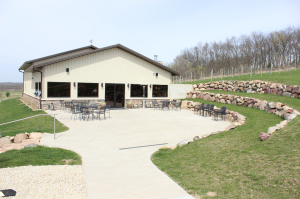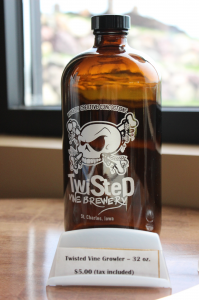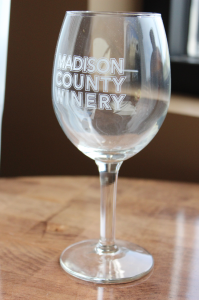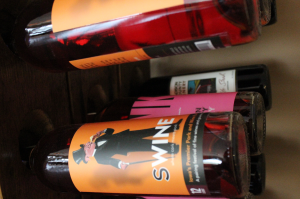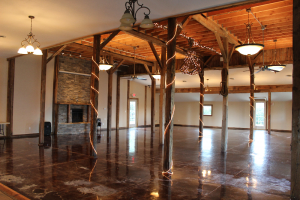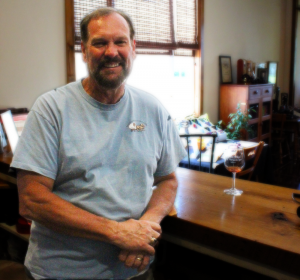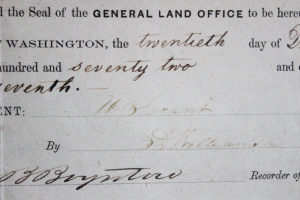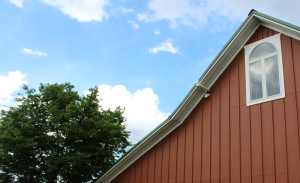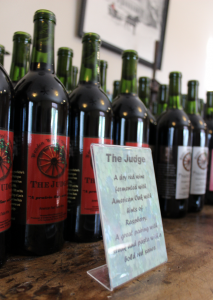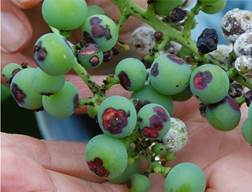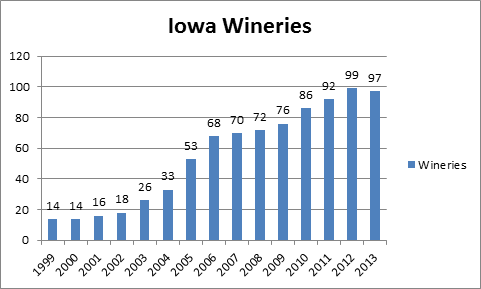A stone-lined terrace cuts into the hillside beneath a slope covered with meticulously tended vines. It hugs the edge of a large patio which overlooks even more vines and a wide swath of farmland below which is accented by a tree-lined ridge rising in the distance. A gentle wind trickles down the hill, carrying away with its whispers the sound from the roadway below, leaving the grounds of Madison County Winery in blissful silence.
Given the beauty of the imagery, it’s not difficult to believe that Doug Bakker, owner-winemaker of Madison County Winery, has a background in art – and it’s even easier to see the evidence of this once inside the creatively designed and artfully decorated facility where form and function work hand-in-hand to provide a flexible space for any number of uses. During regular hours of operation, a rounded and spacious bar greets visitors as they enter the tasting room, but when large parties are expected the bar is split and swung aside. A pair of large doors will then be opened to reveal a dual-purpose storage facility and event space. Works of art by Bakker’s own hand line the walls of the tasting room.
“Really it all started when we were still living in Chicago,” said Bakker. “We were looking to get back to Iowa and we would take our kids out to some of the orchards out around the outer suburbs area and thought that it would be neat to have a leisure destination type place around the Des Moines metro.”
Bakker purchased the land in 2000 and planted all 5 acres of the existing grapes in 2001. Commercial sales of wine began in 2005 and the tasting room opened in May of 2011, along with Twisted Vine Brewery, a ‘nano’-brewery under the management of separate owners.
“Now that there’s a lot more varietals of grape vines that can grow in this area, that’s what led us to do it as a winery rather than an orchard,” said Bakker.
He began learning the trade through the use of Iowa State University’s Extension program and by taking classes at the University of Minnesota. He also participated in mini-apprenticeships in California, Pennsylvania, and Illinois wineries where he would work for free for four or five days as a cellar rat.
“You have to learn hands on, especially if you’re going to do it on a commercial level,” said Bakker. “You can do the home winemaking and make some great wines, but if you want to do it commercially you do need that experience.”
The vineyard at Madison County Winery hosts three grape varieties, including Vignoles, Marechal Foch, and Stueben. But while they enjoyed a fair amount of rain during the spring Bakker estimates that he’ll be ‘lucky’ to harvest 20% of the expected crop this year.
“The years have been kind of tough,” said Bakker. “We’ve had rough years there with no moisture and coming off winter with damage. This year we have a very small crop because of the winter damage last year.”
Another vineyard provides La Crescent to the winery, and despite his interest in the Marquette varietal Bakker is holding off on acquiring that particular variety until he is prepared for additional growth.
“The goal is to [eventually] see an expansion up the hill and to maybe add another production facility,” said Bakker. “Hopefully I’ll find more growers and just continue to expand here.”
He also entertains the idea of producing sparkling wine on a commercial level as well.
“That’s one of the areas that we’ve already started branching into,” said Bakker. “We’ve been doing some testing. I’d really like to do that more.”
Bakker has enjoyed the incredible growth the native wine industry of Iowa has exhibited over the past decade, but he recognizes that growth in itself isn’t necessarily sustainable.
“Iowa is a small state with a small population,” said Bakker. “We’re probably up to saturation point now and what we really need is those top wineries to really put the effort into the best quality wine, to keep stepping up and working with the Wine Institute at Iowa State and really start developing the industry. There’s always going to be those who come in and fall off because they really haven’t done their research and their homework to know what it really takes.”
“It sounds like a good idea until you start doing all the work,” he adds. “And I always tell everybody, seriously, go work and work for free for a while to really figure out if that’s really what you want to do.”
Bakker has high hopes for the development of the wine industry and in ten years he hopes to see Iowa recognized for its quality wines.
“I’d like to see those top-tier wineries really standing out and pushing to move the industry in this state forward,” said Bakker. “Because that is what it’s going to take.”
“In my mind the most important thing is developing the Wine Institute,” he adds. “And that is trying to get that winery built – a working winery for education, research, and actual service to the industry at Iowa State. Or if we can’t get it there, somewhere in the state.”
But while Bakker is highly supportive of the native wine industry, he expresses a desire to branch out beyond the borders of the state to break existing negative perceptions of Iowa wine.
“I’m probably different from some people in the industry who want Iowa-wine-only tastings,” said Bakker. “I want to it to sit right between a French wine and a California wine because I want [tasters] to say ‘Oh, wow’! I want them to compare and I don’t want them to be stuck with only Iowa wine. I want to be put with the others.”
“People come out and they have no idea what we have here,” he adds. “All the wines are good. And that’s what we want, everybody saying ‘it may not fit my style, but it is a good wine’. We really want people to be surprised when they come out here.”
For additional photos and to plan your visit, make your way to Madison County Winery’s website.
